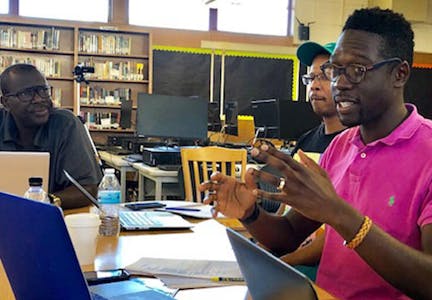The Race Education and Community Healing Network will help create alternatives to suspensions, establish public schools as hubs for racial and community healing.
Aiming to reduce out-of-school suspensions for students in Transitional Kindergarten through twelfth grades and promote alternatives to punitive practices, California’s legislature awarded $1 million over three years to the newly created Race Education and Community Healing (REACH) Network led by the UC Berkeley School of Education and UCLA Center for the Transformation of Schools.
The funding will enable the REACH Network to work across California with public and charter schools, local education agencies, community-based organizations, and universities to develop alternatives to out-of-school suspensions and engage directly with teachers and school leaders to establish public schools as hubs for racial and community healing.

“Teachers need tools to improve their practice. Principals need tools to support teachers. How do we gather these tools? We come together with individuals who have the same north star and we learn from and with them,” said UC Berkeley School of Education Associate Professor Travis Bristol, who will co-lead the project with UCLA Professor Tyrone Howard. “You can tell educators to end suspensions, but that’s not enough. Educators need opportunities to learn how to create school and classroom environments that engage students’ minds and not police their bodies.”
The project is aligned with State Senator Nancy Skinner’s successful SB 274, which is designed to keep students in school by eliminating suspensions for “willful defiance” or low-level behavior issues in TK through grade 12. The bill has passed the state legislature and now sits on Governor Gavin Newsom’s desk.
“SB 274 is based on a simple premise: Students belong in school. Suspending students, no matter what the age, does not improve student behavior. Instead, suspensions greatly increase the likelihood that the student will fail classes or drop out of school completely,” said Senator Skinner. “To put student success first, it’s imperative that we work directly with teachers and school administrators to develop thoughtful and engaging alternatives to out-of-school suspensions so that teachers and classrooms can flourish and students can thrive. That’s why I’m so pleased that we were able to secure funding in this year’s budget for the newly created REACH Network at UC Berkeley and UCLA.”
Research indicates that willful defiance suspensions have disproportionately affected students of color, LGBTQ+ students, students who are unhoused or in foster care, and those with disabilities, and can have a cascading effect on a student’s educational and life outcomes.
“Policy is only a start to ending the overuse of punitive practices in schools that disproportionately impact students of color, LGBTQ+ students, and historically marginalized groups in California. Schools and educators need greater capacity and tools to promote positive and healthy relationships,” said Joseph Bishop, Executive Director & co-founder, UCLA Center for the Transformation of Schools. “Thanks to Senator Skinner’s leadership, we’re going to build upon our statewide CA Multi-Tiered System of Support partnership and focus unapologetically through REACH on the relationship between race, education, and student learning.”
The REACH Network will launch communities of practice for educators statewide to develop and document evidence-based models for alternatives to suspensions, expulsions and criminalization practices in schools. The network will also curate resources and concrete prevention strategies for educators and school leaders and build school-university-community partnerships to promote healthy, safe learning environments to address past punitive harms to students of color and other students who have been disproportionately affected.
The REACH Network will work with a geographically diverse set of schools across California to lower suspension rates and to generate recommendations to expand the efforts across schools statewide.
————-
Media Contact:
UC Berkeley: Andrea Lampros, alampros@berkeley.edu, 510.847.4469
UCLA: John McDonald, jmcdonald@gseis.ucla.edu